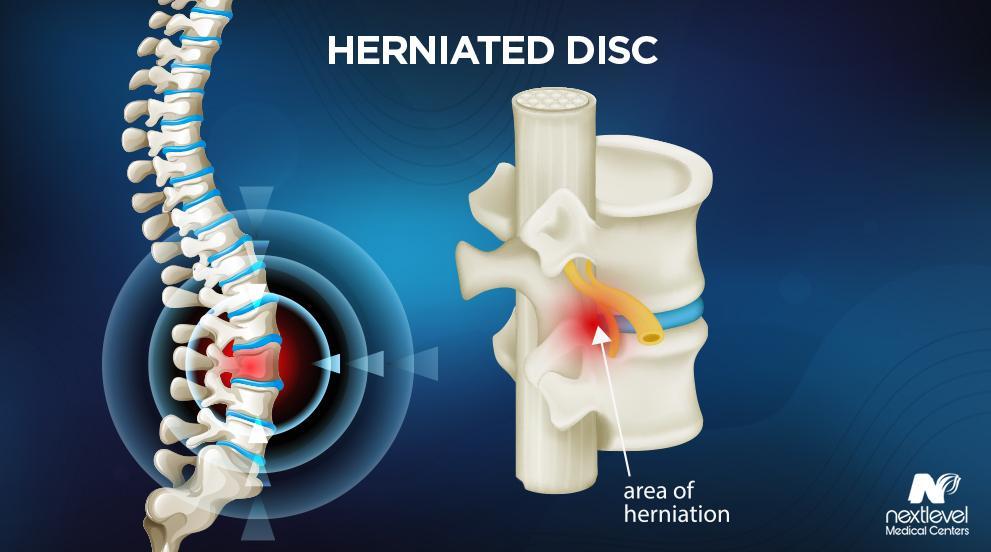

The human spine is a delicate part of our skeletal structure and one of the most critical parts of the body. Unfortunately, all too often, we experience traumatic injuries or wear down the vertebrae that cause our spines to fall out of alignment in some way, inducing pain and discomfort.
One of the most common issues associated with the spine involves a herniated disc along the spinal column. These herniated discs can be extremely painful and disorienting, making performing simple tasks a near-insurmountable feat. As a result, medical science has been undergoing constant growth to combat these painful spinal issues.
One of the more common treatments being sought is as simple as massage therapy. However, some have called the efficacy of such treatment into question. With this article, we hope to provide some insight into whether or not massage therapy can truly help with herniated discs.
Now, you might simply be experiencing pain or discomfort along your spine without fully realizing it is a herniated disc. Unfortunately, it is common since knowing what causes back pain without examination is nearly impossible without training. People often envision spinal issues as bones being out of place and believe that herniated disc involves the very same. However, a herniated disc involves something between the actual bones of your spine. Knowing precisely what a herniated disc is, is the first step in figuring out the best way to address it.
The discs in the spine refer to cushions between the bone that have a rubbery texture to support the spine and prevent vertebral damage. The disk itself consists of a jellylike core called a nucleus encased in the annulus, the aforementioned rubbery component. When a disc is herniated, it refers to a tear forming in the annulus that the nucleus then slips through and destabilizes the disc. The herniated disc presses against the immediate area and can irritate nerves when this happens.

A herniated disc, for that reason, is an extremely unpleasant issue to have. But knowing whether you have a herniated disc can be difficult without insight from a physician. There are several common symptoms associated with herniated discs that can signal to you that it is the issue you are having. Some of the symptoms will depend on where your herniated disc is located along the spinal column. However, it will occur more often than not along the lower back.
One of the main symptoms of a herniated disc in the lower back includes pain in your arms or legs. The pain will often be centered along the thigh or calf, more so than the foot. If your herniated disc is in the neck, you will experience pain in your shoulder and arm. Meanwhile, the pain might spike along the rest of your body following sudden movements or even a sneeze.
Other herniated disc symptoms include numbness radiating throughout the body and general weakness in the muscles. Having a herniated disc is unpleasant, and you might find yourself desperate to alleviate the symptoms in whatever way you can. Fortunately, there are options available to you.
The idea of a herniated disc is likely to be of concern, especially if you do not know what causes it to happen. Fortunately, herniated discs have fairly common causes with little ambiguity around them. Herniated discs generally occur as a simple fact of aging, making the discs less resilient and pliable than they were in your youth. Eventually, enough pressure can cause a disc to herniate and leave you suffering from the effects.
On rare occasions, being struck with enough force can also cause herniations. This issue makes it essential to get yourself evaluated following a traumatic injury to ensure that the force of the blow did not result in a herniation. On top of all of this, certain factors can increase or decrease your risk of suffering from a herniated disc.
Being overweight puts additional strain on your vertebral column and can leave you more susceptible to disc damage. Additionally, if you work in a physically demanding career, you run a similar risk as repetitive, strenuous action can weaken your vertebral discs. Finally, some people simply have a genetic predisposition towards weaker discs.

You can lower your risk by exercising proper form when lifting heavy objects, taking care of your overall weight, being sure to stretch before exercising, not pushing yourself too hard, and taking breaks during strenuous actions. However, understanding what a herniated disc is or what causes it might seem like a cold comfort if you have no way of mitigating the pain. So, now we need to ask how these discs can be effectively treated.
We all know what massages are and that they are more commonly employed for relaxation more than for actual physical health. However, it might surprise you that massage therapy is a common tool for those in the chiropractic field to treat neck and back pain. Generally, it involves a licensed masseuse or chiropractic professional who will treat the pain via manipulating the soft tissue around the afflicted area.
Before the massage begins, your massage therapist will ask a panel of simple questions that you might be interested in knowing ahead of time. For example, you will want to note if you are experiencing chronic pain, currently taking any prescription medications, and assess your overall pain threshold. Of course, the massage will be pretty standard when dealing with something like a herniated disc. Still, this information helps your massage therapist provide a massage ideal for what kind of pain and symptoms you are experiencing.

The sessions themselves will last between 30 to 90 minutes, meaning they will not be time-consuming. As for how often you will need a session will ultimately depend on what you are going through. You might need less than a month’s worth of sessions or several months. On the other hand, you might only need one a week or up to three a week. It honestly depends on how painful your injury is and what it takes to alleviate the pain.
As a non-invasive pain-management option, massage therapy is becoming more popular among those seeking to minimize their pain. It can be used to relieve chronic neck, lower back, and knee pain and improve circulation in the body. As a chiropractic treatment, it is an increasingly popular option. However, the odds are you already know all this. Massage therapy is one the most common techniques used when treating pain along the spinal column, be it the lower back or the neck. The burning question here is whether it can be an effective treatment for a herniated disc.
Now that we understand what herniated discs are and what massage therapy is, you are probably interested in the question that brought you here today. The efficacy of massage therapy for a herniated disc is a contested issue solely because people seek treatment to cure the problem. However, the misconception is that a herniated disc can be cured via treatment.
The reality is that a herniated disc can only heal on its own regardless of intervention by a medical professional. When it comes to treating a herniated disc, the key is managing the pain and allowing the disc a chance to begin the recovery process. The only time a procedure can be conducted to rectify a herniated disc is when it becomes so severe that surgery is the only way to correct it. However, this is only necessary in extreme cases. For the most part, managing the pain is the main component of treating a herniated disc.
This management is where massage therapy comes into play. A licensed chiropractic expert will be able to perform deep-tissue massages around the herniated disc. While this might seem like a trite treatment option, massages can be an excellent way to manage pain. This efficacy is because massaging the afflicted area is an excellent way to relax the muscles around the herniated disc and reduce the pain. Doing so allows the herniated disc to begin healing if possible while preventing you from suffering an abundance of pain.

This effective treatment avenue is supported by a study conducted back in 2014 where a 60-minute massage, two to three times a week, could relieve chronic neck pain. For those who suffer from a herniated disc in the neck, this is a standing demonstration of how effective massage therapy can be for regulating pain and giving the disc time to recover. In the simplest sense, massage therapy is beneficial for treating the symptoms of a herniated disc and allowing your body the opportunity it needs to begin recovering on its own.
However, massage therapy cannot cure a herniated disc in and of itself, meaning you should temper your expectations of what massage therapy will be able to do for you. Expecting massage therapy to reverse the herniation will only set you up for disappointment, but it can still greatly benefit your recovery. But do not hesitate to begin seeking treatment of some kind since allowing a herniated disc to remain unattended can lead to further complications.
Now, herniated discs might generally recover on their own if you take steps to avoid exacerbating the damage or minimizing the symptoms. However, going about your everyday routines without taking the disc into account can backfire in extremely painful and unfortunate ways. Furthermore, as we previously mentioned, a herniated disc that gets too severe will require surgery to correct. In contrast, a non-invasive treatment regimen will protect the average patient from such extreme measures.

However, if a herniated disc goes completely untreated, you run the risk of developing more severe conditions. For example, you could develop cauda equina syndrome, a physical ailment that can cause incontinence or difficulty urinating. Even worse, you can develop saddle anesthesia, which is the progressive loss of feeling around your inner thighs, the back of your legs, and the area around the rectum. All of this, besides the fact that you will be experiencing intensified pain from the disc itself, makes leaving it untreated a mistake.
You should never postpone treatment of any physical ailment, whether a disc has been herniated or not. However, severe injuries will only open the door to worse conditions if you leave them untreated for too long.
Herniated discs are an unfortunately common spinal issue that can be debilitating to your everyday life if the issue is severe enough. Unfortunately, the disc cannot be directly treated without surgery. Still, such endeavors are not always necessary since a herniated disc will tend to recover on its own so long as the damage is not exacerbated. However, when it comes to the pain you experience due to herniation, there are methods you can employ to mitigate these effects and give your body time to heal. Massage therapy happens to be one of the most commonly employed of these methods.

The only remaining question is finding someone who can provide effective massage therapy for your needs. To that end, we at Ortho Integrative would like to offer our services. We specialize in many treatment avenues for a wide array of physical ailments. In addition, massage therapy happens to be one of our major services among several other chiropractic treatments. So, if you suffer from a herniated disc and have decided on massage therapy, consider checking out our services. You might find that our services can help take your physical health to the Next Level.
If you have any questions or concerns regarding either herniated discs, massage therapy, or the services that we can provide for you, please feel free to reach out at any time. We know that living with a herniated disc is no easy task, and would love to help you out however we possibly can, whether that be via answering questions, clearing up any concerns, or treating you.